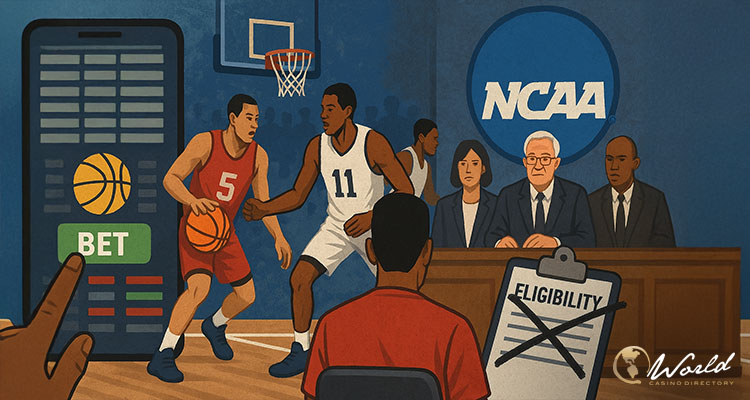The NCAA has handed down permanent bans to three Division I men’s basketball players following an investigation into sports-betting violations that compromised game integrity. The Committee on Infractions announced that Mykell Robinson, Steven Vasquez, and Jalen Weaver wagered on their own contests, bet on each other’s performances, and shared insider details to aid others in placing bets during the 2024–25 season.
According to the findings, Robinson and Vasquez even went as far as altering their level of play in certain games to ensure favorable outcomes for bets. Such conduct was deemed a clear violation of NCAA ethical standards, leading to their permanent loss of eligibility.
All three athletes were dismissed from their teams and are no longer enrolled at Fresno State or San Jose State, their most recent schools. The institutions themselves were not penalized.
Suspicious Bets Sparked Investigation
The case originated when both Fresno State and a sports betting integrity service flagged questionable prop bets tied to Robinson. A Nevada sportsbook had raised concerns in January 2025, and the NCAA enforcement staff launched an investigation soon after.
That probe revealed that Robinson and Vasquez, former roommates at Fresno State, exchanged text messages that month in which Robinson disclosed plans to underperform in specific categories during a game. The two, along with a third individual, wagered a combined $2,200 on his underperformance. The outcome resulted in a $15,950 payout split among those who placed the bets.
The investigation further found that Robinson made 13 daily fantasy sports wagers involving his own performances, totaling $454. While he did not profit from every bet, he did record one $618 win.
Additionally, Robinson placed several bets involving Weaver, who was still his teammate at Fresno State. Before a late December 2024 matchup, Robinson and Weaver exchanged details about their prop betting lines. Weaver then entered a $50 parlay that included himself, Robinson, and another player, netting $260.
Cooperation and Consequences
Robinson and Vasquez refused to cooperate with NCAA investigators, while Weaver admitted to his role and agreed to the violation in his case. Despite that, all three players now face the same penalty: permanent ineligibility from NCAA competition.
Current guidelines, updated in 2023, generally dictate a lifetime ban for athletes who gamble on their own contests, although reinstatement is theoretically possible if supported by an NCAA institution. Still, the Committee on Infractions confirmed that the severity of these offenses warranted the harshest sanction.
Panel members who reviewed the case included Jason Leonard, executive director of athletics compliance at Oklahoma; Kay Norton, president emerita at Northern Colorado; and Roderick Perry, former athletics director at the institution then known as IUPUI.
NCAA’s Wider Concerns About Sports Betting
The NCAA has faced mounting challenges with sports betting in recent years, particularly as gambling has become legal in more states. The organization disclosed earlier this year that its enforcement staff has been handling a growing number of betting-related cases.
“The enforcement staff’s sports betting-related caseload has significantly increased in recent years, and our staff — including our new sports betting integrity unit — has been effective in detecting and pursuing violations,” NCAA vice president of enforcement Jon Duncan said in June.
While the NCAA is considering a proposal to permit student-athletes and staff to gamble on professional sports, the prohibition on betting within college athletics remains firm. Any wager involving a student-athlete’s own team or sport continues to carry the risk of permanent loss of eligibility.
For Robinson, Weaver, and Vasquez, the investigation has closed with their basketball careers in the NCAA officially over.


